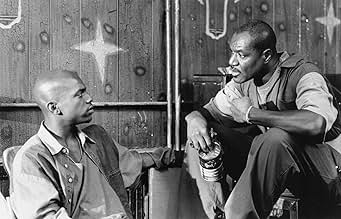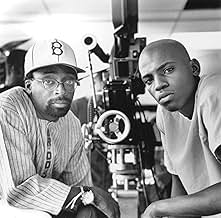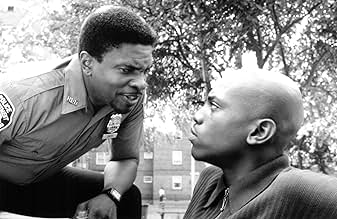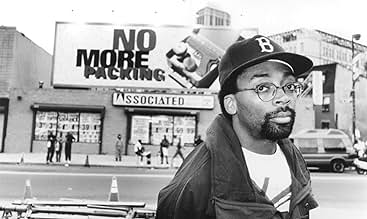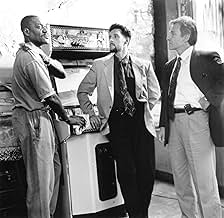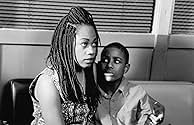उनके ड्रग बॉस और उन्हें पकड़ने निकले जासूसों के बीच फंसे ब्रुकलिन की परियोजनाओं में युवा ड्रग पुशर्स खतरनाक और कठोर जीवन जीते हैं .उनके ड्रग बॉस और उन्हें पकड़ने निकले जासूसों के बीच फंसे ब्रुकलिन की परियोजनाओं में युवा ड्रग पुशर्स खतरनाक और कठोर जीवन जीते हैं .उनके ड्रग बॉस और उन्हें पकड़ने निकले जासूसों के बीच फंसे ब्रुकलिन की परियोजनाओं में युवा ड्रग पुशर्स खतरनाक और कठोर जीवन जीते हैं .
- पुरस्कार
- 6 कुल नामांकन
- Tyrone
- (as Pee Wee Love)
- Errol Barnes
- (as Tom Byrd)
- Go
- (as Fredro)
- Horace
- (as E.O. Nolasco)
- Sharon
- (as Lisa Arrindell Anderson)
फ़ीचर्ड समीक्षाएं
The main plot is a form of crime thriller, with Keitel playing the cop trying to uncover the truth behind the murder. However the plot is not what this film is about - this is basically a film about the effects on drugs on the NY ghettos. Strike is the "average black man", while his protégé, Tyrone (Peewee Love) is "black youth". The film tries to show the forces placed on them by their situation, their role models and the few options they have in life. Rodney represents the draw of selling drugs, of quick money while policemen Andre (Keith David) and Klein represent his conscience trying to get him to do the right thing - Andre and Tyrone's mother (Regina Taylor) particularly doing right by your own community.
The message is at times forced, Keitel's sequence towards the end is very clever cinematically but feels a bit like a sermon, but at other times we're allowed to work it out ourselves. Strike is not judged but allowed to be pulled by the situation around him, his sickness representing the sickness of his situation. Through him we see the pressures that are on him to act like his peers and the bad role-models he has in his life. In Shorty we see the same things affect the next generation and, while his aping of Strike is clumsy, you again see how the lack of good role-models reduces the options for an otherwise intelligent kid. The best thing about the comparison of Lindo and Keitel is that neither is judged - both are allowed to show themselves as appealing, Lindo appears as a parent, almost seeking the best for all his workers and Keitel is allowed to be an honest cop with a good moral code. However both are also seen in a bad light, Lindo brings out the violence, pressure and treachery of his character - a man who is really out for himself while the way Keitel pressures Strike is seen as bad as Rodney's pressure and reveals a racist angry streak within himself. We are left wondering how anyone can survive between the two.
Phifer is good as Strike and manages to avoid just doing a ghetto-movie type of performance, he makes you believe that he is trapped in a no-win situation. Isaiah Washington gives another in a string of strong performances as the honest man trying to get by. Lindo is great as drug dealer Rodney, mixing paternal aspirations with moments of sudden viciousness. Keitel and John Turturro act below their station and aren't given much to work with, Keitel especially doesn't always manage to carry the moral core of the story without preaching. Two small roles of interest are Tom Byrd as Errol who has plays the fallen dealer with AIDS, however not enough is explained about his character, also Michael Imperioli (better known as Chris in The Sopranos) plays bent cop Jo-Jo. Peewee Love stands out as Shorty/Shorty, sucked into a world that lacks choice.
The film looks great, the whole thing has a bright colourful sheen on it that is very attractive to look at. Combined with Lee's stylish director it makes for a beautiful film - although some scenes are shot differently and on different stock, to make a point, although I'm not sure what that point is. The music is as good as most of Lee's movies, a mix of soul and hip hop, it is better than many ghetto films that just assume that the hip hop is all that's needed to help the mood.
This is a good example of the lack of options that exist in the ghetto and, besides some very obvious preaching, it makes it's point without shouting it at the audience. The only failing is that Lee bottles it near the end, delivering a sentimental ending of hope that is unfortunately not the truth in many cases.
The way I see it, this is being a pretty good portrayal of live on the streets in the '90's. It picks a mostly realistic approach but still I just can't really 'feel' this movie. I never felt involved with any of the characters in it or to any of the dramatic events and developments. It doesn't make this movie bad but it does indeed make this movie a bit of a one dimensional experience.
And remember, this is an 1995 movie. So everything that was considered to be hip and 'thug life' might seem a bit ridicules and less cool in today's perspective. The whole attitude and way of talking and the way everyone dresses makes this movie really a product of its time. In that regard this movie also really reminded me of "Kids", which coincidentally or not, got made in the same year as this movie. It makes this movie less relevant to watch now days but really, it's nothing I was holding against the movie.
I would had most definitely preferred it if this movie was using a more straightforward style of storytelling. The movie as it is seems to be wanting to focus on far too many different characters and tries to do and tell too much. It also really has its own style to it, when it comes down to its storytelling, which was nice and helped to give this movie an unique feeling but at the same time it also made the movie unnecessary hard and not all that pleasant to follow at times.
Another thing I also disliked about this movie was its pick of music. The movie mad some bad music choices, in which the music often would swell and become melodramatic at moments that really were uncalled for. It absolutely distracted and most of the time didn't suit what was happening on the screen at the time.
But really, I though this movie still had some hints of a great movie in it as well. One thing was its already earlier mentioned unique and distinctive style. Spike Lee always has had an unique and distinctive style of his own and he manages to put a lot of that in this movie successfully. There are some interesting moments in this movie, from a more technical and movie-making perspective. There was some good camera-work for instance and also very little wrong with the movie its editing and pacing.
The movie its story in essence also really seemed to be a solid one but I do feel that they perhaps should had picked some different perspectives to keep- and make things a bit more interesting and effective. Wouldn't this movie for instance had been better and more interesting if it told things more from the Harvey Keitel's character perspective? Who knows and it's not like the movie bad or interesting as it is right now but while watching this movie it constantly gave me the feeling it had more potential and things could had been done better.
I don't know, perhaps the movie was also being a bit stuck between being a gangster movie and a more realistic one. It never felt like a true gangster flick and it never felt like a true realistic movie neither. Producer Martin Scorsese perhaps should had stepped in a bit more often, since he definitely is a kind of director who can more successfully blend realism with tough and tense gangster/crime movies.
Not trying to sound too negative. The movie is good enough as it is but it doesn't ever reaches its full potential.
7/10
http://bobafett1138.blogspot.com/
Lee does not hang around in presenting or perhaps delivering his subject matter as a whole. The thing that amazes me with Lee is that he can write so many different types of characters: low grade African-Americans, educated and seemingly decent African-Americans; white cops; women of different ethnicity and a few others. In Clockers, the opening scene which integrates with the credits is of a somewhat crude and humiliating public autopsy during which a couple of white cops examine a dead black man in front of a watching black crowd. Two of these detectives are Rocco Klein (Keitel) and Larry Mazilli (Turturro) but the scene acts as one final act of humiliation to an already dead black man as they search his carcase for clues and bullet holes.
But the film has more than one current flowing throughout it. Strike (Phifer) plays a neighbourhood African-American who speaks and acts just like all his drug dealing friends, even hanging with them when they act out their drug selling routine to customers in a staged manner. But Strike is different and Lee wants us to create an alternate profile of the man by giving him milkshakes to drinks and trains to collect, set up in his apartment, maintain and run. The others laugh at this hobby but Strike maintains most of them too have hobbies: collecting welfare cheques. But this is the greatness of a character like Strike; we are led to believe he is a bad influence through the dialogue of a police man named Andre the Giant (David) but this is perhaps just another cop's point of view and opinion on another African American kid.
Andre believes Strike to be a bad influence on Tyrone (Love) but what Andre fails to notice is that there are higher, more criminal minds badly influencing Strike and that is more of a problem than Strike talking to Tyrone. The film is about a seemingly nice and somewhat moral 'gangstar' who is put in a situation where murder is the only way out, and we go through the narrative with the emphasis on this moral gangstar that he is actually a cold blooded killer in an excellent and very effective piece of atmosphere. But this is a slow burner and it slowly burns away at our opinion because there is a scene in Strike's apartment when he talks to Tyrone all about drugs and guns, apparently Tyrone should stay away from taking drugs but selling them will bring him a nice chunk of change; however guns are something that Tyrone should seriously consider getting into. To top this scene off, Tyrone is told that mathematics is also a very good thing. Already, Lee is trying to manipulate and force us to change out minds as to weather we like Strike. Is he a killer? Does he know drugs should be completely avoided? Why does he suggest Tyrone get a gun one day? Or is it just a misguided fool repeating what he once heard and saying what he thinks is right. Interesting how later on Tyrone repeats train information to another person after sort of adopting a 'Strike' figure.
But the film has some more strong points. Rodney Little (Lindo) thinks that just because he has had a shotgun in the mouth and was manipulated into murder, he can do it to others. Little himself asks Strike "How are you so smart and so stupid?" in a scene that actually has someone echo Strike's personality to his face. Little's background in presented in a nasty and somewhat disturbing fashion via flashback to the days when he was younger with Errol Barnes (Byrd), the resident 'hood psychopath-come-criminal who seems to have some distorted views to do with religion. With all this in the melting plot, it's no wonder the film does a good job in maintain interest and quality delivery. Lee does not fail to focus on his subject matter like he does in Summer of Sam when tackling the psychological development of a serial killer and a love triangle at the same time became messy. Instead, he does not get sidetracked with any unnecessary sub-plots and keeps the delivery sharp, realistic and intriguing when the final act comes to an end.
क्या आपको पता है
- ट्रिवियाWas originally supposed to be directed by Martin Scorsese. Rocco Klein would have been the main character, played by Robert De Niro. Scorsese changed his mind, opting instead to direct Casino (1995), and De Niro went with him. Scorsese then asked Spike Lee if he wanted to direct. Lee accepted (and decided that Strike, not Rocco, would be the primary character), and Scorsese was given an "Executive Producer" credit.
- गूफ़When Detective Mazilli is walking up to the back of the Mercedes Benz to talk to the kids inside his badge/shield is that of an NYPD Detective. However when he shows it to the driver of the car it is the shield of a NYPD Sergeant.
- भाव
Rodney: If God created anything better than crack cocaine, he kept that shit for hisself. I mean, that shit is like truth serum. It will truly expose who you are. I mean, you happen to be a low-life rat bastard motherfucker, who will sell off his newborn for a suck off that glass dick, crack will bring it right on in the light. Now, I don't care you black, white, Chinese, rich, poor. You take that first hit, you on a mission. And that mission will never end. Even when the house, the money, loved ones are gone, they send you to the joint, you still gonna try to cop.
Ronald 'Strike' Dunham: No doubt.
Rodney: Only time it ends, Strike, that mission, when you six feet under.
- कनेक्शनFeatured in Crooklyn Dodgers: Return of the Crooklyn Dodgers (1995)
टॉप पसंद
- How long is Clockers?Alexa द्वारा संचालित
विवरण
- रिलीज़ की तारीख़
- कंट्री ऑफ़ ओरिजिन
- भाषा
- इस रूप में भी जाना जाता है
- Clockers: Hermanos de sangre
- फ़िल्माने की जगहें
- उत्पादन कंपनियां
- IMDbPro पर और कंपनी क्रेडिट देखें
बॉक्स ऑफ़िस
- बजट
- $2,50,00,000(अनुमानित)
- US और कनाडा में सकल
- $1,30,71,518
- US और कनाडा में पहले सप्ताह में कुल कमाई
- $44,63,560
- 17 सित॰ 1995
- दुनिया भर में सकल
- $1,30,71,518
- चलने की अवधि2 घंटे 8 मिनट
- रंग
- ध्वनि मिश्रण
- पक्ष अनुपात
- 1.85 : 1
इस पेज में योगदान दें



